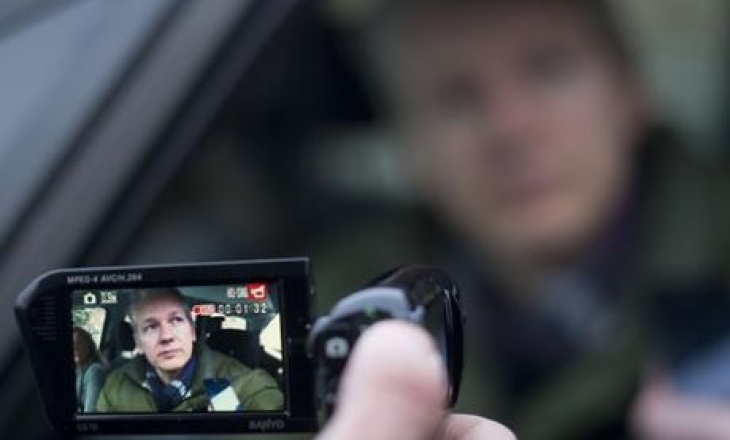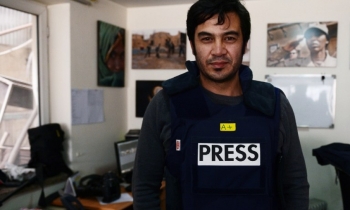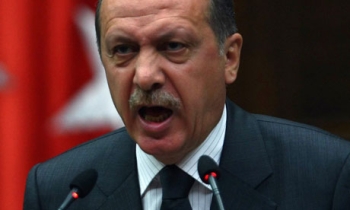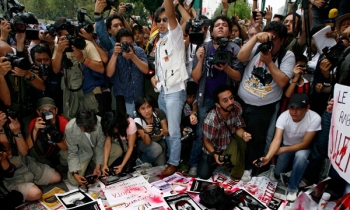Press freedom groups have urged US President Barack Obama and Attorney-General Eric Holder to avoid prosecuting WikiLeaks and its founder Julian Assange for publishing classified cables and other documents.
Chairman Paul E Steiger and Executive Director Joel Simon of the New York-based Committee to Protect Journalists (CPJ) , and Jean-François Julliard Secretary-General of Paris-based press freedom group Reporters sans Frontières (RSF) have written separate letters to Obama and Holder.
Steiger and Simon wrote:
Based on everything we know about these events, we urge you to avoid such action. Our concern flows not from an embrace of Assange's motives and objectives. Indeed, we wish that he would fully disclose his sources of financing and support. But the Constitution protects the right to publish information of important interest to the public. That right has been upheld through decades of American jurisprudence and has served the people well.
On Thursday, the House Judiciary Committee held hearings on the implications of prosecuting Assange under the 1917 Espionage Act. We believe that such a prosecution could encourage the government to assert legal theories applying equally to all news media, which would be highly dangerous to the public interest. History shows that Congress didn't intend the law to apply to news reporting. Over nearly a century, the government has refrained from using the act against the media. To reverse these long-standing positions would threaten grave damage to the First Amendment's protections of free speech and the press.
As CPJ seeks to defend freedom of expression and the safety and rights of journalists around the world, we find that by far the largest share of imprisoned journalists are jailed on antistate charges, including publishing information that governments deem secret. In the past, we have been proud to point to the United States as a place where journalists may not be jailed because they published something that offends government officials. It would be an incalculable loss to freedom everywhere if America lost its role as a shining example, and authoritarian governments abroad could say they were only doing what the United States was doing in jailing reporters or editors for what they published.
CPJ urges the Justice Department to protect freedom of speech and the press, along with the country's global reputation as a beacon of those values, by standing back from any prosecution of WikiLeaks or Assange for publishing classified documents.
Julliard wrote:
We regard the publication of classified information by WikiLeaks and five associated newspapers as a journalistic activity protected by the First Amendment. Prosecuting WikiLeaks’ founders and other people linked to the website would seriously damage media freedom in the United States and impede the work of journalists who cover sensitive subjects.
It would also weaken the US and the international community efforts at protecting human rights, providing governments with poor press freedom records a ready-made excuse to justify censorship and retributive judicial campaigns against civil society and the media.
We believe the United States credibility as a leading proponent of freedom of expression is at stake, and that any arbitrary prosecution of WikiLeaks for receiving and publishing sensitive documents would inevitably create a dangerous precedent.
Members of the faculty at the Columbia University Graduate School of Journalism wrote to you recently warning that “government overreaction to publication of leaked material in the press has always been more damaging to American democracy than the leaks themselves.” We fully agree with this analysis.
The ability to publish confidential documents is a necessary safeguard against government over-classification. We urge you to use this debate to review the government’s policy of classifying documents in order to increase transparency in accordance with the promises made by the administration when it first assumed office.
The Media, Entertainment and Arts Alliance (MEAA) of Australia has welcomed the widespread support being expressed within the media and entertainment industries for WikiLeaks editor Julian Assange and the public's right to know. The Federal Media Committee of the Media, Entertainment & Arts Alliance met Friday and voted to show solidarity with the campaign to support Assange, who has been a member of the Alliance for some time.
At the 55th Annual Walkley Awards for Excellence in Journalism on Thursday night, federal secretary Christopher Warren said: "Tonight, journalists and editors around the world are concerned about the attacks on WikiLeaks. This is an issue of freedom of the press. People have a right to information through the opportunities provided by the web. Journalists remain ready to fight for the principle of exposure journalism."
The winner of the Gold Walkley Award, Laurie Oakes, used part of his speech to attack the hysteria over WikiLeaks, and strongly criticised Prime Minister Julia Gillard and Federal Attorney-General Robert McClelland for saying that Assange had done something illegal by publishing the leaked diplomatic cables.
"What they said was ridiculous. To brand what the WikiLeaks site has done as illegal when there is no evidence at all of any breach of the law was, I think, demeaning. I think as journalists we should make it clear that that is our view. Whether it's a letterbox full of classified cables, or a quarter of a million documents in digital form, the principle is the same, and we should fight for the right to publish."
"Alliance members are behind Assange in his campaign to publish in the face of government attempts to curb the public's right to know," Alliance federal secretary Christopher Warren said. "Assange has taken the ethical responsibilities of the press seriously by collaborating with established media outlets in order to withhold information that could threaten lives. His organisation has done nothing more than publish information that holds governments to account, and we stand by him in his right to do so."










